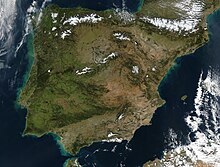Spanish irredentism

Spanish irredentism mainly focuses on claims over the British overseas territory of
Northern Africa, the Roussillon (including Cerdanya) and the French Basque Country (including Lower Navarre
).
Unification of Iberia
A Spain holding all of the
Roman Hispania when all of the Iberian Peninsula was united under the same rule.[1] The identification of a unified Hispanian cultural heritage both encompassing Portugal and Spain had been developed centuries earlier with the publishing of Juan de Mariana's History of Spain (1598), in which Mariana supported a Hispanian identity based on the Reconquista, on both countries' Roman-Visigothic heritage and their common Catholic and monarchical polities.[1]
There has been strong Spanish objection to the separation of Gibraltar from Spain since British acquisition in the
French Pyrenees into Spain.[5] Franco in a communiqué with Germany on 26 May 1942 declared that Portugal should be annexed into Spain.[6]
The years of
Mauritania Tingitana", part of the Roman Diocese of Hispania. Some of these authors, transcending historical arguments, even pointed at the Spanish-African union during "the Tertiary Epoch" when the Strait did not exist.[11]
To a lesser extent, territories adjacent to Equatorial Guinea were also subject to irredentist rhetoric in this time.[12] Claims were also made about the Spanishness of Andorra, Roussillon, Cerdanya, Lower Navarre, and the French Basque Country.[13][14]
See also
- Gibraltar
- United Nations list of colonial territories
- Spanish nationalism
- Iberian federalism
References
- ^ ISBN 0521480655.
- ^ Tibor Frank, Frank Hadler. Disputed territories and shared pasts: overlapping national histories in modern Europe. Palgrave Macmillan, 2011. p. 339.
- ^ M. K. Flynn. Ideology, mobilization, and the nation: the rise of Irish, Basque, and Carlist national movements in the nineteenth and early twentieth centuries. Palgrave Macmillan, 1999. p. 178. [ISBN missing]
- ^ Wayne H. Bowen. Spain during World War II. Columbia: University of Missouri Press, 2006. p. 26. [ISBN missing]
- ^ Stanley G. Payne. Fascism in Spain, 1923–1977. Madison: The University of Wisconsin Press, 1999. p. 331. [ISBN missing]
- ^ Paul Preston. Franco: a biography. BasicBooks, a division of HarperCollins, 1994. p. 857.[ISBN missing]
- ^ Parra Montserrat 2012, p. 140.
- ^ Parra Montserrat 2012, p. 137.
- ^ Parra Montserrat 2012, p. 138.
- ^ Parra Montserrat 2012, p. 208.
- ^ Parra Montserrat 2012, pp. 138–139.
- ^ Parra Montserrat 2012, p. 141.
- ^ Parra Montserrat 2012, p. 101.
- ^ Parra Montserrat, David (2012). La narrativa del africanismo franquista. Génesis y prácticas socio-educativas (PDF). p. 142.
